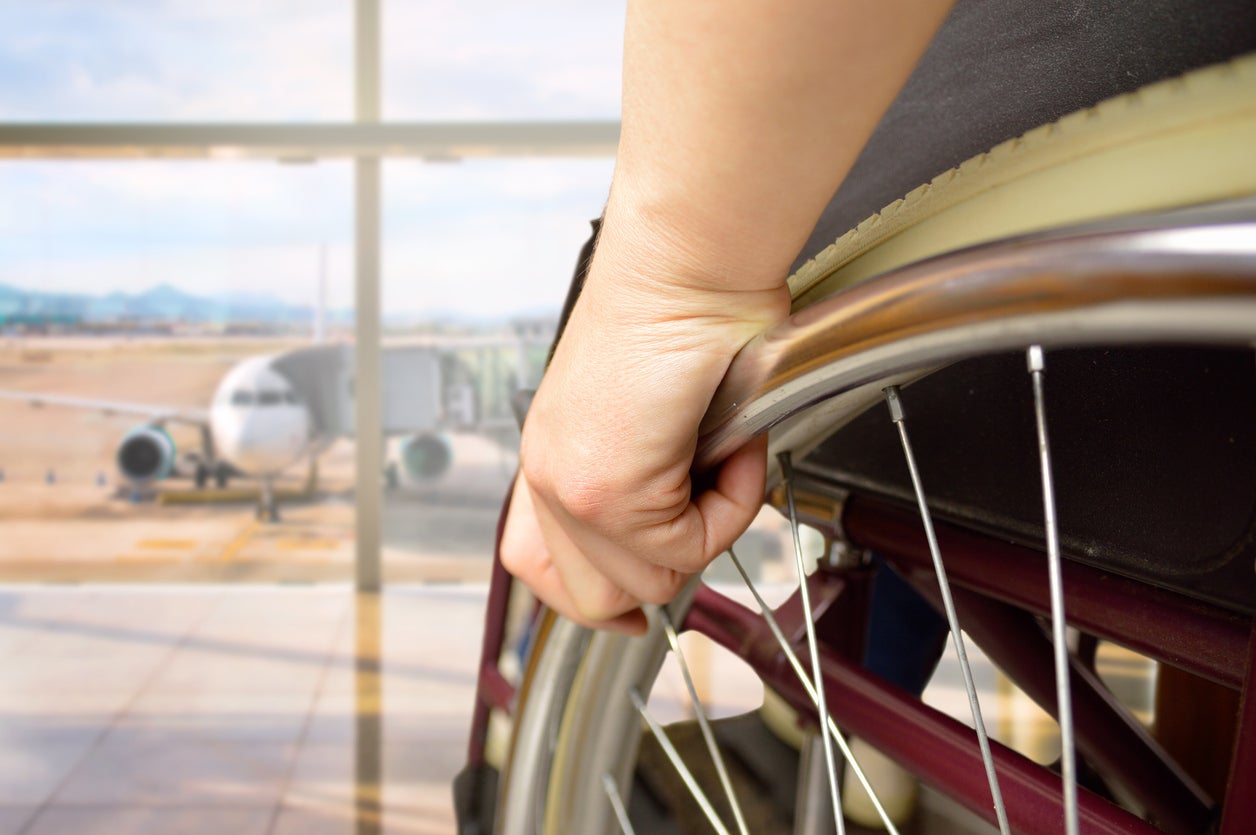Disabled passengers ‘humiliated’ when travelling through UK airports
Which? survey reveals travellers with reduced mobility are ‘robbed of their dignity’ when flying

Your support helps us to tell the story
From reproductive rights to climate change to Big Tech, The Independent is on the ground when the story is developing. Whether it's investigating the financials of Elon Musk's pro-Trump PAC or producing our latest documentary, 'The A Word', which shines a light on the American women fighting for reproductive rights, we know how important it is to parse out the facts from the messaging.
At such a critical moment in US history, we need reporters on the ground. Your donation allows us to keep sending journalists to speak to both sides of the story.
The Independent is trusted by Americans across the entire political spectrum. And unlike many other quality news outlets, we choose not to lock Americans out of our reporting and analysis with paywalls. We believe quality journalism should be available to everyone, paid for by those who can afford it.
Your support makes all the difference.Disabled air passengers are frequently “humiliated”, robbed of their dignity and at times even physically hurt when travelling through UK airports, according to new research from Which?.
The consumer champion found that nearly half (46 per cent) of passengers with reduced mobility felt unable to fly in the past two years because of their disability.
Conducted by the Research Institute for Disabled Consumers (RiDC) on behalf of Which?, the survey quizzed 363 of its panel of disabled consumers about their experiences of air travel.
Of the respondents who had used special assistance at an airport, 25 per cent said that they were dissatisfied with the service.
Participants also indicated whether they had been satisfied with the service they had received at various UK airports.
Heathrow scored the lowest, with 28 per cent of passengers saying they had been dissatisfied with the service they had received.
This was followed by Manchester (22 per cent); Luton (20 per cent); Gatwick (17 per cent); and Stansted (11 per cent).
Anecdotally, many participants had shocking stories to share about the treatment they had received when passing through airports and boarding flights.
Martyn Sibley, a keen traveller who uses a wheelchair, reported having his foot caught and bent back as he was being lifted into a plane seat, which pulled tendons in his ankle.
One 76-year-old with severe arthritis reported being abandoned at Heathrow, despite having booked special assistance.
She had to drag herself through the airport with no help, an experience she said left her feeling “drained and near collapse”.
A Heathrow spokesperson said: “We apologise for the experience that (the passenger) had when travelling through our airport. Since 2016, we have invested over £23m in new equipment, facilities and training to improve our assistance service and we will continue to work with our industry partners to push for more collaboration that results in a seamless service for all of our passengers.”
Another passenger found that, although there was a wheelchair waiting for him at Manchester Airport, no one was available to push it.
His wife was forced to do it herself, but lost control of the chair on the sloped air bridge – it crashed at the bottom, leaving her husband “dazed and shocked”.
A Manchester Airport representative said: “OCS is no longer our special assistance provider, having been replaced by a new company, ABM, on 1 April. As part of this new deal, there has been significant investment in additional staff and new equipment, which is being reflected in an improved performance.”
All UK airports must, by law, provide help to any disabled passenger who needs it, free of charge.
The most recent report from regulator the Civil Aviation Authority (CAA) found that there are now no “poor” airports for disabled access in the UK and only one, Manchester, is ranked as “needs improvement”.
However, Which? believes more needs to be done to ensure disabled passengers can travel with dignity.
“Not one single person should have to suffer the indignities and pain we heard about in the course of this investigation,” said Rory Boland, Which? travel editor.
“But it seems these experiences of inadequate airport accessibility services are all too common, so it’s unsurprising that thousands of disabled travellers feel unable to fly.
“It’s also unacceptable. Airports have a legal responsibility to provide these services and more needs to be done to ensure no passenger is made to feel this way just because they wanted to take a holiday.”
It follows numerous Independent reports of disabled passengers who have experienced poor treatment from airlines and airports.
In July 2019, a disabled passenger spoke out against Emirates’ “appalling” treatment of her after the airline broke her wheelchair and failed to offer any response for almost three months.
Jen Warren, an anaesthetist and mother of two from Rugby in the West Midlands, said the carrier had “really upset” her by leaving her “in limbo” after her flight in April.
“They’ve treated me absolutely appallingly,” she told The Independent. “Not only have they trashed my wheelchair, but they don’t seem to care.”
After The Independent got in touch, Emirates finally sent Ms Warren an official email offering £650 towards the cost of a new wheelchair.
In November, USA Today Network released a report revealing that, between January and September 2019, US carriers mishandled at least 7,747 wheelchairs – an average of 29 a day.
Join our commenting forum
Join thought-provoking conversations, follow other Independent readers and see their replies
Comments